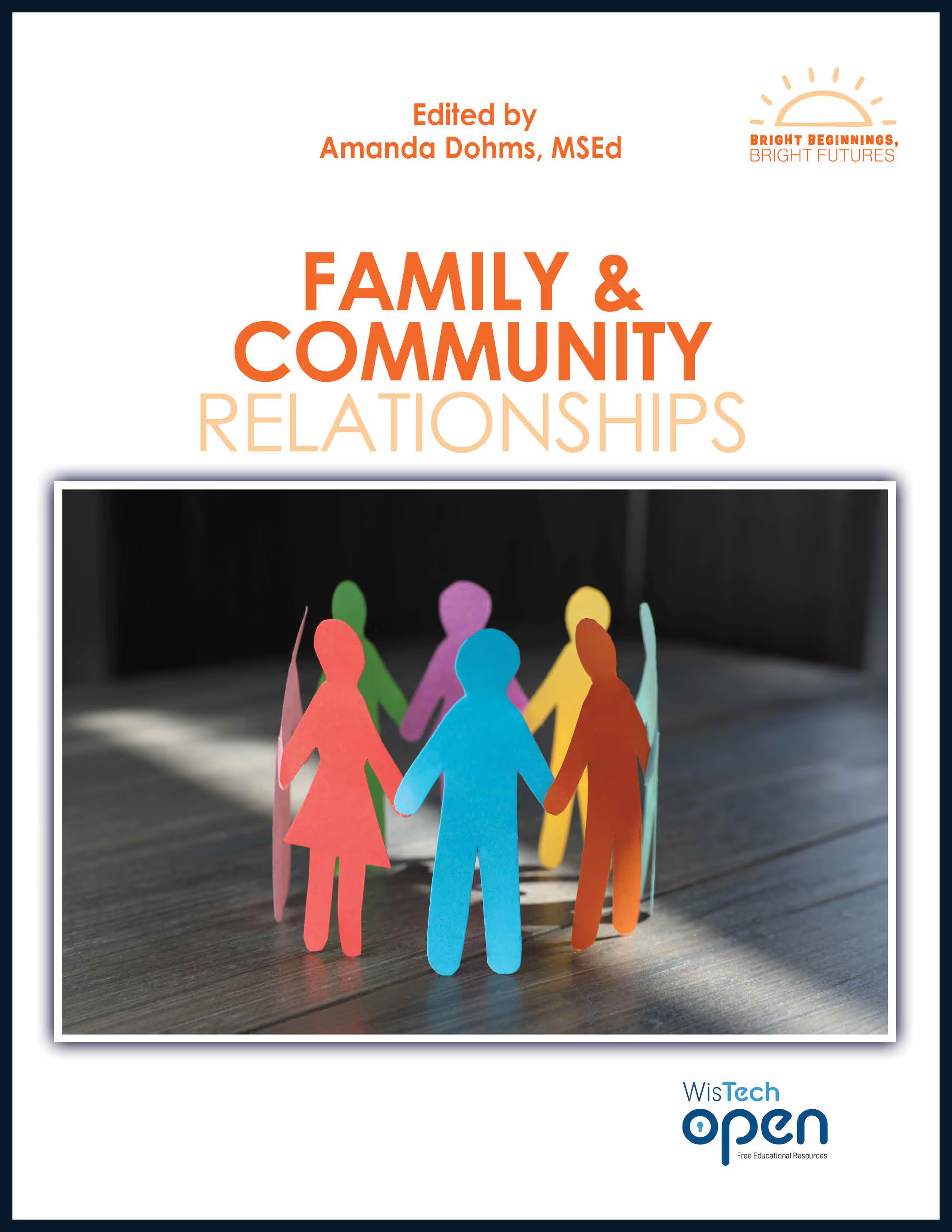Course Competency 1: Analyze family patterns and trends.
- Develop a definition of family that is inclusive and diverse.
- Explore various family structures (e.g., nuclear family, one-parent family, foster family, gender-diverse parents).
- Describe trends affecting families.
- Analyze circumstances in families’ lives that influence child and family members’ actions.
- Explore literature and classroom resources related to diverse family patterns and trends.
Course Competency 2: Integrate strategies that support diversity, equity, and inclusion.
- Describe how a family’s culture influences their values, perceptions, beliefs, celebrations, and parenting practices.
- Analyze the influence of your own experiences on your perceptions and attitudes toward diverse families and on your caregiving practices.
- Explain why educators have a responsibility to understand family life and how it impacts teaching.
- Outline the importance of involving families in the development and implementation of celebrations and activities that respect their traditions and values.
Course Competency: Identify strategies to strengthen and support families.
- Define common stressors families may encounter.
- Analyze factors that protect families against stress (i.e., Strengthening Families Protective Framework).
- Identify strategies to support families in developing protective factors.
- Review program practices in supporting and strengthening protective factors.
- Analyze a strength-based approach to working with families.
- Explain how trauma-informed care supports children and families.
Course Competency 4: Analyze effective communication strategies.
- Utilize effective communication techniques.
- Identify barriers to effective communication.
- Recognize how personal patterns affect communication style.
- Identify strategies for conflict resolution.
- Develop strategies for communicating with families in ways that are culturally sensitive and respect the family’s home language and communication styles.
- Explore the responsible use of technology to communicate with families.
Course Competency 5: Discover strategies for developing respectful and reciprocal relationships with families.
- Identify strategies for initial encounters with children and families.
- Identify techniques for building cooperative partnerships with families.
- Recognize the progression in educator-family relationships.
- Analyze barriers to educator-family relationships.
- Analyze common sources of tension between families and educators.
Course Competency 6: Analyze strategies to promote family engagement in early childhood education programs.
- Identify a range of levels of family engagement.
- Identify strategies that promote and sustain meaningful family engagement.
- Recognize the barriers to effective family engagement.
Course Competency 7: Outline formats for meeting with families in their contexts.
- Identify strategies to conduct successful informal and formal family-educator meetings.
- Recognize the purpose and goals of family-educator conferences.
- Examine how home visits are used in a variety of community agencies.
Couse Competency 8: Advocate for children and families.
- Examine your role as an advocate.
- Explore public policy that affects children and families.
- Identify a range of advocacy strategies.
Course Competency 9: Identify community resources that provide a range of services for children and families.
- Describe the types of services needed by diverse families.
- Analyze a broad range of services provided by local community organizations.
- Develop a collection of resource agencies.
- Describe how to match local services to the needs of a family.
You are free to:
– Share — copy and redistribute the material in any medium or format
– Adapt — remix, transform, and build upon the material for any purpose, even commercially
Under the following terms:
– Attribution — You must give appropriate credit to WisTech Open, provide a link to the license, and indicate if changes were made. You may do so in any reasonable manner, but not in any way that suggests WisTech Open endorses you or your use.
License: https://creativecommons.org/licenses/by/4.0/
WisTech Open, including the Open RN and Bright Beginnings series, does not provide ancillary or instructor materials. You can instead create free, customized supplementary resources—slides, quizzes, worksheets, study guides, and more - on demand, through our generative AI platform, WisTech Fusion: https://www.wistechopen.org/wistech-fusion. Fusion only uses content from WisTech Open, Open RN, and Bright Beginnings resources.
To help keep print textbook costs low for our students, please consider using the electronic version, or purchasing a personal print copy, rather than requesting a publisher/desktop version from our printing partner. Orders can be placed through Kendall Hunt: https://he.kendallhunt.com/catalog.

.svg)
